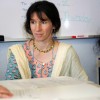This is the first in a series of essays I am writing based on my thoughts and experience as a devotee of Krishna, associated with ISKCON, in the 21stCentury. These thoughts are mine and mine alone, resonant surely with other devotee's thoughts, but not representative of any community, temple president, or any other personality or spiritual master
I have submitted this piece to such websites as ISKCON News and Dandavats and so far it have not been published. While I hardly think the thoughts I have here are “radical” in any way, I have noticed a certain hesitancy to discuss some of the issues herein, like the place of LGBTQ people within our society of devotees, or to associate these issues in any kind of official capacity with the institution of ISKCON. This I find frustrating, because there are many devotees like myself who want to understand how our society can relate in a more honest and relevant way with our fellow brothers and sisters on this planet.
I hope that these words add to a fruitful and healthy dialogue as to the present and future shape of our devotional society. I intend no offense with these words, and if I cause offense by these words, I sincerely and humbly beg your forgiveness.
One of the most powerful spiritual experiences I have ever had in my life was when I had the chance to visit Srila Prabhupada's room at the Radha-Damodara Mandir in Vrndavana. It was, as you can imagine or may have experienced yourself, overwhelming to be so distinctly in the presence of Srila Prabhupada. His vibrations still filled the room so clearly, so mystically, if I may use that term with all sincerity, so long after his presence last filled that room physically. I immediately could sense my own place, who I was, who I wasn't, and what I was being asked to do, now that I had come this far, and committed as much as I could to becoming a servant of Prabhupada's mission.
All I could really do (all I can really do anyway) was pray, and beg. I begged to be given the chance to be a part, to be a servant, of carrying Prabhupada's mission forward into the 21stCentury. Contemplating this responsibility felt like a two-ton weight on my shoulders. Everything I had considered serious in a materialistic sense up to that point in my lfe had the buoyancy of a riven cloud compared to the weight of this calling for Prabhupada. It was a frightening feeling in one sense, because I had never considered anything so serious, but it was also a liberation, a clarity that burned away the angst I had felt as a confused American kid in my twenties trying to find sense and belonging in the isolating substance of the material world which surrounded me.
With as much love and humility as I could muster, I simply asked Prabhupada for the chance to serve his heart. I asked for the chance to share the gift he had given me, that he had given all of us. Rarely before or since have I been able to find such a prayerful state. I felt embraced by Prabhupada for my efforts, trusted even to do what he needed me to do, despite the primary fault of my existence in this world. I've always wanted to be a revolutionary, and here the chance was being given to me in a way I never could have imagined. Every step I would now take, even if it was sideways, even if it was backwards, was to be shaped by this calling. To have any hope, I would just have to hang on to Prabhupada's lotus feet and never let go.
**
I was recently approached by a new friend over Facebook, a gay man who wanted to share his story and his anguish in approaching the bhaktitradition, and in particular ISKCON temples. He was clearly and deeply attracted in his heart to Krishna, and he wanted to walk forward in that resonance of his heart. Yet he had encountered prejudice because of his sexual persuasion when he had gone to his local temple. He was deeply affected by this, and he asked if there was anything I could tell him to help with his spiritual anxiety. I told him about the Bhakti Center community in New York City, where I had lived for over three years and how it was generally more welcoming than most Hare Krishna temples, but other than this, I had no easy answer for this obstacle of prejudice that he was encountering.
It broke my own heart to hear this. I simply wondered, on the level of common sense, how those claiming to represent the tradition of bhakti, those who claimed to represent the exquisitely magnanimous heart of Prabhupada, who have the obligation, as best as they can, to represent the pure and perfect love of Krishna, could look at someone from the vision of their body, and turn them away from the gift they themselves had been given.
This exchange shook me to my core, and left me with some serious and probing questions. What were these devotees missing or misunderstanding in the way they had related to my friend? How does this reflect what we may be missing or misunderstanding in our communication as devotees to the world at large today? What could I be missing or misunderstanding in my own conception and perception of Krishna consciousness? If we are telling ourselves, and if we are telling others, that “you are not the body”, how can we can judge anyone by their body? “You are not the body” is a saying every devotee has as an essential tool in their arsenal of spiritual communication, but I often wonder, as many devotees do, if we really understand what this means? Do we really understand that this saying, as essentially true as it is, can have an alienating effect upon others if we do not also know how to respond, comprehend, and comfort the bodily prejudice so many people experience in this world?
**
I am now a student at Union Theological Seminary in New York City, which is one of the oldest and most prestigious independent and progressive Christian seminaries in America. It is a place where I have the great fortune of having my spirituality shaped through many different sophisticated, outrageous, and radical lenses. It is a place where I am able to see and experience the beauty, pain, and struggle of how so many others outside of the “traditional ISKCON” universe understand the nature of God and reality. It is a place where I can develop my identity as a progressive devotee. What does this mean to be a progressive devotee? For me, it is a conscious choice to live one's devotional calling by examining how the purport of Prabhupada's mission, and the culture and tradition of bhakti which comes from that mission, can communicate in the most relevant concert and concern with the contemporary time, place, and circumstances of the 21stCentury. To be a progressive devotee is not to abandon the fundamental principles that Prabhupada has given us, but it is to consider, as Prabhupada himself did, how to make these principles realistic and relevant for the people of this age.
To be a progressive devotee is a precarious position. It brings upon the serious concern and even condemnation of those devotees who are deeply suspicious of anything labeled as such, who feel that to label oneself progressive is to commit the offense of abandoning Prabhupada's core teachings. It creates the opportunity to respond in a very offensive manner to the sincere concerns of these devotees. I know I myself must be careful to use this label, for the reality is that all sincere devotees of Krishna are truly the most progressive people on this planet. We have been given a revolutionary process which questions the very status quo of material existence itself. To label one set of devotees as progressive and another as conservative is a dangerous political game, yet for the nature of these essays, I want to highlight certain distinctions, perspectives, and proclivities that devotees share and don't share, as a way of highlighting serious issues and arguments which are shaping, and will shape, the future of Prabhupada's mission in the 21stCentury.
There is nothing I can do in preventing devotees who are concerned with my position from expressing their concern. This is their sacred and natural right to do so, and I welcome any conversation that does not come from or lead to offensive attitudes and expressions. My response to their concern and their criticism must stand on the solid ground of the wisdom that Prabhupada has given us. I write this essay in that spirit, standing on the bedrock of the gift of Prabhupada's wisdom as much as I can, and in that spirit, I hope to contribute to a fruitful and much needed dialogue in ISKCON. In that spirit, I hope that my own misconceptions can be corrected, that our mutual unhealthy assumptions can be confronted and transcended, and that the practice and art of our spiritual communication can be brought to a more profound and relevant level.
***
The heart of my concern as a progressive devotee is a question of the engagement, and the relevance of that engagement, of our movement to society at large. There are two levels of relevance to be considered here: the ultimate relevance of bhakti and of Krishna consciousness to the existential situation of being in the material world, a relevance that is beyond reproach and even the vagaries of human reason itself. Then there is the theological and sociological relevance of Prabhupada's movement to the concerns of our contemporary society, concerns which include social justice, civil rights, poverty, ecological collapse, amongst so many other connected issues. Here is where I, and many other devotees, feel that our movement suffers in its communication and in its relevance. I was particularly struck by something that Yogesvara Dasa (Joshua Greene), an esteemed and long-standing disciple of Srila Prabhupada, said in an interview with an academic publication on “Being a Krishna Devotee”
“The most candid comment I can give about public perception of Hare Krishna in North
America is that I don’t think there is one anymore. The worst possible thing has happened,
namely indifference. There was a time going back 20 years perhaps when there was a public
perception of the Hare Krishna movement in the sense that people felt accosted in airports or
read reports of abuses or saw devotees chanting in public. Devotees were a more visible part
of the landscape of American culture previously.
Maybe then one could say there was a public perception because Hare Krishna was in the news, it was on television, it was in the papers for good or for bad...I believe that Vaishnavism as it has been historically will not be the same in the future for the simple reason that the world it lives in is not the same. There is a compulsion within Vaishnava faith to move into the larger society and to become relevant, and the Vaishnava community has yet to demonstrate its relevance. For 99.99 percent of the world we don’t matter. Krishna Consciousness is irrelevant to most of the world.”
To be relevant, and to find relevance, is to always be considering how the prophetic voice of our movement is responding to the concerns of our fellow living entities on this planet. It is to be open to having a historicistapproach to how we express our faith in the world. We are not raw historicists, in that we believe in an Absolute Truth that is beyond the relativism of history, yet our prophetic voice is best expressed with an intelligent application of our principles to the time, places, and circumstances which we are intimately connected to.
To find our relevance means to understand that we should not frame our communication to others in such a way that we ignore who they are and where they are coming from. We also have to prove our worth and pull our weight. We may not be of this world, but we are in this world. This we cannot ignore. We have to learn to give the gift that Prabhupada has given us in such a way that it makes sense in people's lives and to the concerns in their life. We may tell someone that they are not the body, and yet by doing so, we may completely ignore how we can relate our transcendental message to their particular situation of bodily marginalization, pain, and oppression. We may completely ignore the questions they have for us, as to how the heart of bhakti, of Krishna's love, speaks to the body they live in and the ground they stand on.
In our relation as devotees to the material world, to our own bodies, and the bodies of others, we must learn to be transcendent, and we must learn to acknowledge. To be transcendent is to truly understand that we are eternal spirit souls, lovers and friends of Krishna, whose true home is the spiritual world, and that our ultimate destiny is the liberation of pure devotional service. This is the goal and perfection of our existence, and all that we do should direct us and all others towards this goal. This is the gift that Prabhupada has given us.
One of the most powerful and eternally relevant verses Krishna speaks in the Bhagavad-Gita is this:
The humble sages, by virtue of true knowledge, see with equal vision a learned and gentle brāhmaṇa, a cow, an elephant, a dog and a dog-eater [outcaste]. (5.18)
This verse calls all devotees, all living entities, to a spiritual vision and lifestyle which has no room for bodily discrimination. For me, this verse gives us the foundation of equality and justice which underlies all movements for the same within the material realm. The vision of the sage is the essential and pristine vision which must be at the core of all movements for equality and justice in the material world, from the fight for civil rights for those who are marginalized because of their race, gender, or sexuality, all the way to the consideration of the right to life, decency, and sustainable health for the wide diversity of plant and animal life that this planet holds. As Srila Prabhupada writes in his purport to this verse:
A Kṛṣṇa conscious person does not make any distinction between species or castes. The brāhmaṇa and the outcaste may be different from the social point of view, or a dog, a cow and an elephant may be different from the point of view of species, but these differences of body are meaningless from the viewpoint of a learned transcendentalist. This is due to their relationship to the Supreme, for the Supreme Lord, by His plenary portion as Paramātmā, is present in everyone’s heart. Such an understanding of the Supreme is real knowledge.
The vision of the sage sees reality as it actually is, but this doesn't mean that the sage ignores the reality that is right in front of him/her. When Prabhupada says that the “differences of body are meaningless”, he is not saying that those who claim to be a sage should treat everyone the same regardless of their bodily situation. The real sage does not discriminate according to the body. He/she gives the same grace of spiritual knowledge to everyone regardless of the color of their skin, the shape of their caste, or whatever their sexual preference is. The humble sage is able to use his/her intelligence to shape their message in such a way so that the mercy of Guru and Gauranga speaks specifically and intimately to each person's bodily/mental/existential situation.
The humble sage is able that to understand that to merely say “you are not the body” and not acknowledge the person's specific psycho-physical makeup is not enough. This acknowledgement is the supremely compassionate and intelligent awareness of the bodily, social, political, and sexual contexts that people come from, allowing the principles of bhaktito speak to them in such a way that it doesn't add to the injustice and oppression that they may face because of their body. To be able to acknowledge in this way is to give the gift Krishna consciousness so that it confronts this oppression and injustice and gives the ways, means, and inspiration to transcend it.
Frankly, in the general history of ISKCON, I feel that we not effectively learned how to transcend and how to acknowledge. I kneel and beg to be corrected, but I don't just base this statement on my own speculation, but on the experience and sincere feelings of many other devotees that I have encountered. Because we struggle so much to transcend and acknowledge our own bodies and our own standing in this world, we are left with a number of psychological and psychosocial hang-ups which have crippled much of our outreach. It has tended to harden our hearts, and with our hearts encased in the stone of our guilt, envy, and shame, how can we truly acknowledge and answer to those who approach us wanting to transcend their own pain and walk towards the loving embrace of Krishna?
As we try to mature in treating the subject of our transcendence with more compassion, patience, and common sense than has been the history of our movement, as we try not to “storm the gates of heaven”, as we understand that to purify our hearts is something that is the journey of a lifetime, or lifetimes, that must be done hand-in-hand and heart-to-heart with each other, we must learn to acknowledge our own bodies, our own material natures, and how these aspects of our existential situation can lead us further on to transcendence.
To be able to acknowledge means to not see our bodily and material situations as obstacles which should be smashed, but as aspects of our being which must be seen in the light of compassion and the wisdom of sastra, andalso in the light of our common sense and natural experience of our lives in this world. We have to reach people at the point of how they live their own lives, in the reality of their social location, and not through any oppressive assumptions of meaning that we may have of what their lives and bodies represent. In the same way we have to meet our own experience as devotees in terms of who we actually are, and not through the frameworks of assumption others may place upon us.
In the next essay I hope to further develop these points, to acknowledge my own discomfort with identifying with ISKCON, and to ask a serious question of devotees: do we really understand how bad the Kali-Yuga is in the manifestations which presently surround us and which oppress so many of us.























































